2023年江西中考英语复习 七年级下册 Units 7~9课件(共84张PPT)
文档属性
| 名称 | 2023年江西中考英语复习 七年级下册 Units 7~9课件(共84张PPT) |  | |
| 格式 | ppt | ||
| 文件大小 | 1.1MB | ||
| 资源类型 | 教案 | ||
| 版本资源 | 人教新目标(Go for it)版 | ||
| 科目 | 英语 | ||
| 更新时间 | 2023-06-11 06:41:25 | ||
图片预览

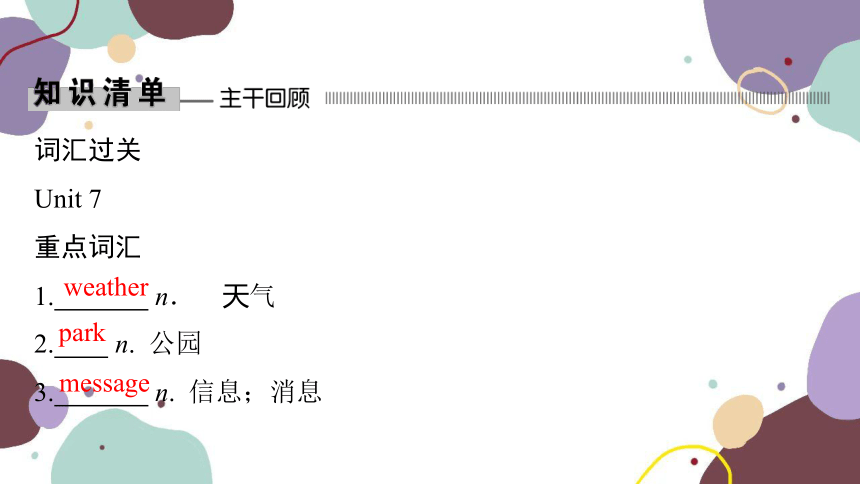

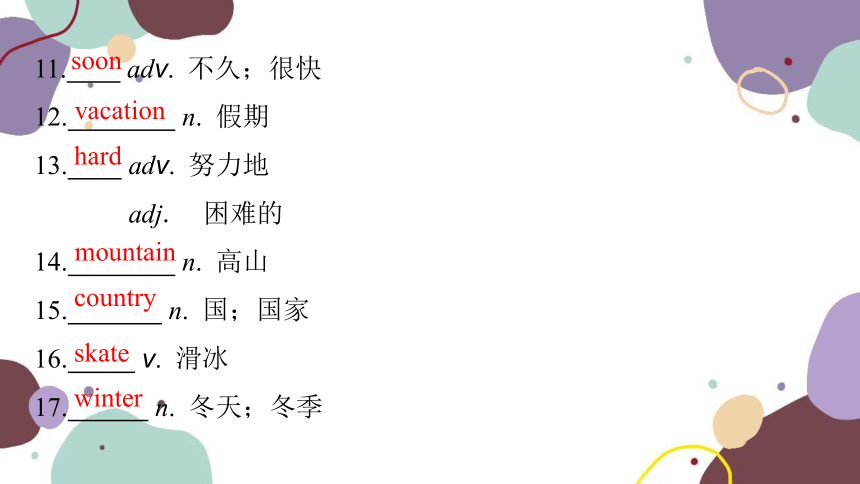
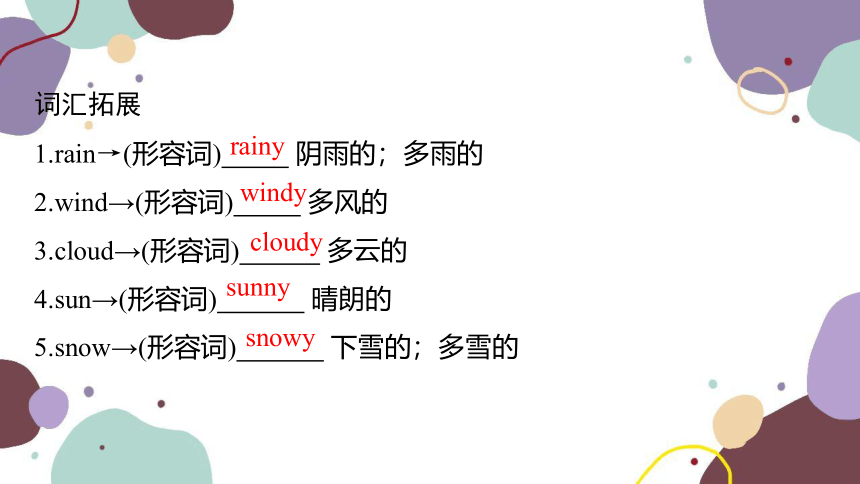

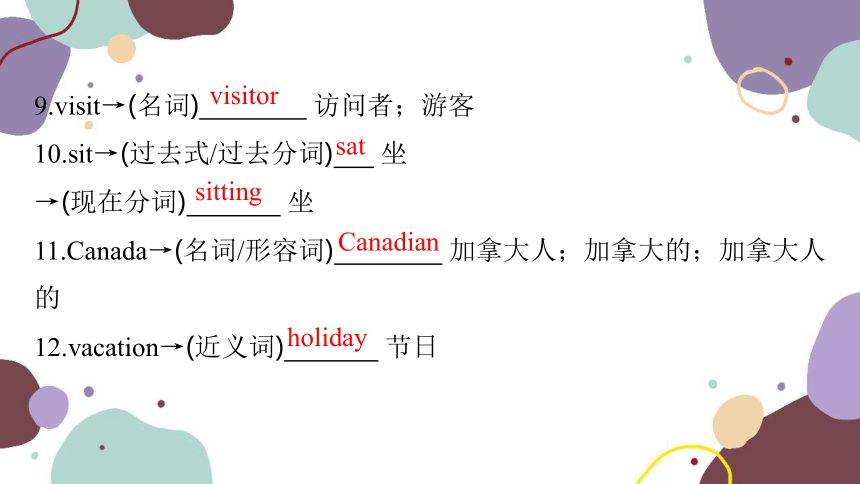
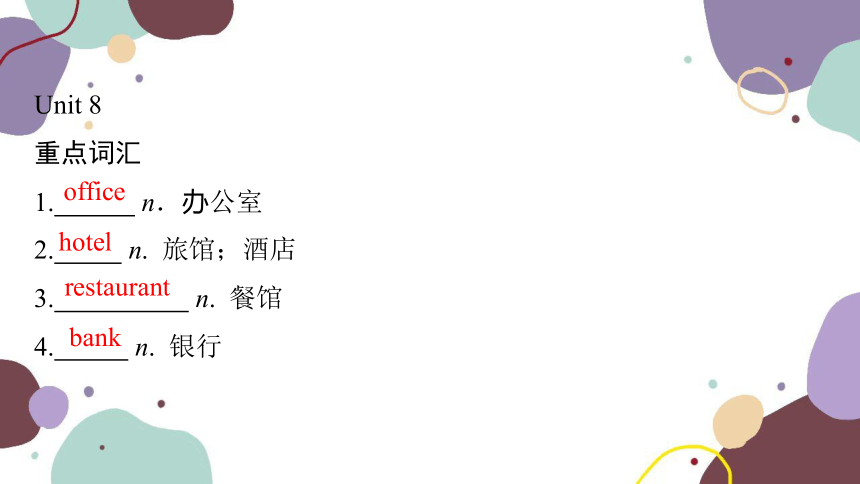
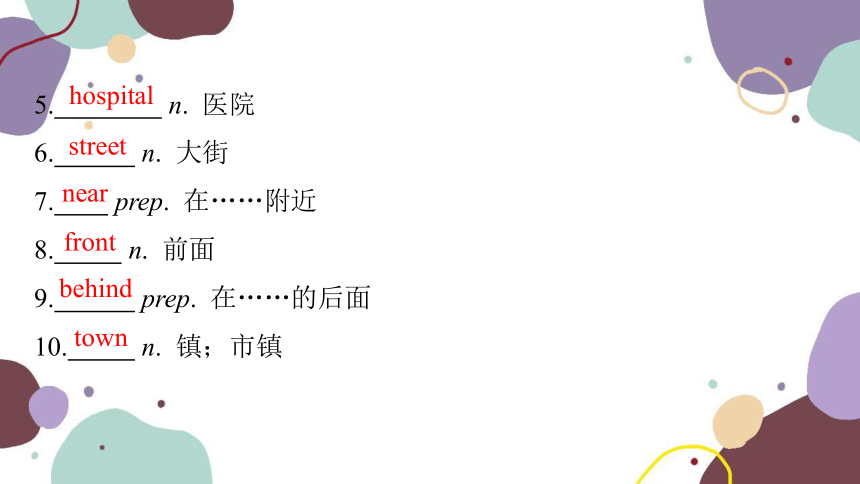

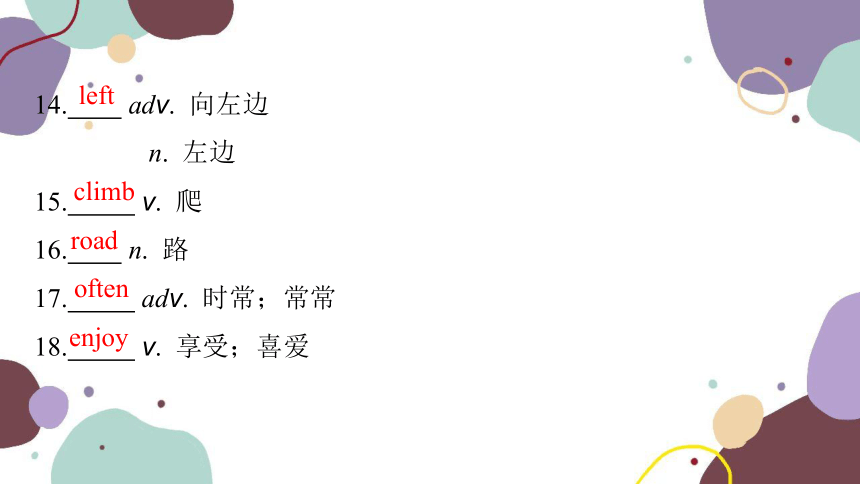

文档简介
(共84张PPT)
七年级下册 Units 7~9
词汇过关
Unit 7
重点词汇
1. n. 天气
2. n. 公园
3. n. 信息;消息
weather
park
message
4. adv. 回来;回原处
5. n. 困难;难题
6. adv. 再一次;又一次
7. adj. 干燥的
8. adj. 寒冷的;冷的
9. n. 夏天;夏季
10. n. 果汁;饮料
back
problem
again
dry
cold
summer
juice
11. adv. 不久;很快
12. n. 假期
13. adv. 努力地
adj. 困难的
14. n. 高山
15. n. 国;国家
16. v. 滑冰
17. n. 冬天;冬季
soon
vacation
hard
mountain
country
skate
winter
词汇拓展
1.rain→(形容词) 阴雨的;多雨的
2.wind→(形容词) 多风的
3.cloud→(形容词) 多云的
4.sun→(形容词) 晴朗的
5.snow→(形容词) 下雪的;多雪的
rainy
windy
cloudy
sunny
snowy
6.cook→(名词) 厨师
→(名词) 炊具
7.hot→(比较级) 较热的
→(最高级) 最热的
8.warm→(比较级) 较温暖的
→(最高级) 最温暖的
→(名词) 温暖
cook
cooker
hotter
hottest
warmer
warmest
warmth
9.visit→(名词) 访问者;游客
10.sit→(过去式/过去分词) 坐
→(现在分词) 坐
11.Canada→(名词/形容词) 加拿大人;加拿大的;加拿大人的
12.vacation→(近义词) 节日
visitor
sat
sitting
Canadian
holiday
Unit 8
重点词汇
1. n.办公室
2. n. 旅馆;酒店
3. n. 餐馆
4. n. 银行
office
hotel
restaurant
bank
5. n. 医院
6. n. 大街
7. prep. 在……附近
8. n. 前面
9. prep. 在……的后面
10. n. 镇;市镇
hospital
street
near
front
behind
town
11. adv. 在周围;大约
prep. 在……周围
12. v. 转向;翻
13. adv. 向右边
n. 右边
around
turn
right
14. adv. 向左边
n. 左边
15. v. 爬
16. n. 路
17. adv. 时常;常常
18. v. 享受;喜爱
left
climb
road
often
enjoy
词汇拓展
1.post→(动词) 邮递;张贴
2.office→(名词) 军官;警官;公务员
3.police→(复数形式) 警察
→(名词) 男警察
→(名词) 女警察
post
officer
police
policeman
policewoman
4.bank→(名词) 银行家
5.pay→(过去式/过去分词) 付费;支付
6.spend→(过去式/过去分词) 花(时间、钱等)
7.across→(动词) 横过;穿过→(名词) 十字路口
8.north→(形容词) 北方的;北部的
9.free→(副词) 自由地;免费地→(名词) 自由
banker
paid
spent
cross
crossing
northern
freely
freedom
Unit 9
重点词汇
1. adj. 直的
2. adv.& n. (在)今晚;(在)今夜
3. n. 电影院
4. pl.(n.) 眼镜
straight
tonight
cinema
glasses
5. adv. 以后
6. adj. 英俊的
7. n. 人
8. n. 鼻子
9. n. 嘴
10. adj. 圆形的
later
handsome
person
nose
mouth
round
11. n. 脸
12. n. 眼睛
13. adj.& pron. 每个;各自
14. n. 方式;路线
15. adj.& pron. 另一;又一
16. n. 结尾;尽头
face
eye
each
way
another
end
词汇拓展
1.height→(形容词) 高的
2.thin→(比较级) 较瘦的;较薄的
→(最高级) 最瘦的;最薄的
3.heavy→(副词) 沉重地;猛烈地
4.build→(名词) 建筑
high
thinner
thinnest
heavily
building
5.little→(比较级) 较少的
→(最高级) 最少的
6.act→(形容词) 活跃的;积极的
→(名词) 女演员
→(名词) 男演员
→(名词) 行动
less
least
active
actress
actor
action
7.person→(形容词) 个人的;私人的
8.put→(过去式/过去分词) 放
9.describe→(名词) 描写;形容
10.different→(名词) 差别;差异
→(副词) 不同地
11.real→(副词) 实际上;真正地
personal
put
description
difference
differently
really
重点短语
Unit 7
1.捎个口信;传话 _________________
2.度假 _________________
take a message
on (a) vacation
Unit 8
1.在……对面 ____________
2.在……前面 ___________
3.向右转 __________
4.go along (the street) _________________
5.enjoy reading __________
across from
in front of
turn right
沿着(这条街)走
喜欢阅读
Unit 9
1.(be) of medium height __________
2.一点;少量 ________
3.at first _______
4.in the end _______
中等身高
a little
首先
最后
重点句型
Unit 7
1.— the weather in Shanghai?上海的天气怎么样?
—It's cloudy.(天气)多云。
2.—How's it going?情况怎么样?
— ,thanks.还不错,谢谢。
How's
Not bad
Unit 8
1.— restaurants near here?这附近有一些饭店吗?
—Yes, one the post office.是的,在邮局前面有一个。
2. there,I usually walk out and Bridge Road.要去那里的话,我通常步行外出,在大桥路向右转。
Are there any
there's
in front of
To get
turn right on
Unit 9
1.—What does he ?他长什么样?
—He has and wears glasses.他有棕色的头发并且戴着眼镜。
2.—OK.Is he tall or short?好的。他是高还是矮?
—He isn't .He's of medium height.他不高不矮。他中等身高。
look like
brown hair
tall or short
语法
1.现在进行时(Ⅱ)
2.存现句
3.地点介词
4.选择疑问句
话题
Unit 7 The weather (天气)
Unit 8 The neighborhood (邻里之间)
Unit 9 Physical appearance (外貌特征)
询问天气的句型
[考点演练]
1.—What's the weather like in your hometown
—It's .I am making a snowman with my sister.
A.sunny B.rainy
C.snowy D.windy
C
2.—What do you think the weather
—It's rainy.
A.of B.about
C.with D.in
A
3.A:___________________________________________________
__________
B:It was sunny last Sunday. I went on a picnic with my family.
4.A:What will the weather be like tomorrow
B: . We need to take an umbrella with us if we go out.
How was the weather last Sunday/What was the weather like last Sunday
It will be rainy
[考点精讲]
询问天气的句型有以下三种:
(1)How is/was the weather...
(2)What is/was the weather like...?/What will the weather be like...
(3)What do you think of the weather...
其答语常为:It's+描述天气的形容词.
[拓展延伸]
常见描述天气的形容词
辨析in front of 与in the front of
[考点演练]
5.Whenever I go traveling,I always sit the bus so that I can get a good view of the scenery outside.
A.in the end B.in front of
C.in the back of D.in the front of
D
6.The truck me stopped suddenly and I couldn't continue my driving.
7.Jenny is shorter than other students,so she always sits ___________ the classroom.
in front of
in the front of
[考点精讲]
[一言辨异]
In the front of the classroom,Mr.Zhang is having a lesson in front of his students.在教室前面的张老师正站在他的学生前面给他们上课。
辨析spend、take、cost与pay
[考点演练]
8.I only paid two dollars this book five years ago,but it still brings me something new even today.
A.with B.for
C.to D.on
B
9.Time is valuable,so try to spend our time just the things that are worth doing.
A.by B.through
C.in D.on
D
10.
It was a nice holiday during the National Day.I went to Yichun with my friends. It _____ us half of the day to arrive there. Before the trip,we'd _____ lots of time searching for the beautiful places in Yichun. And we _____ a lot of money for the tickets. During the trip,we bought many local products which didn't _____ us too much. We really had a good time there. We all hope to go there once again.
took
spent
paid
cost
[考点精讲]
[一言辨异]
She paid 50 yuan for this skirt.
=She spent 50 yuan on this skirt.
=This skirt cost her 50 yuan.这条裙子花了她50元。
辨析a little、little、a few与few
[考点演练]
11.After playing football for more than half an hour,the students took _______ minutes' rest.
a few
12.We must consider how to solve this problem quickly. There is ______ time left.
13.In order to learn in Japan,I have learned Japanese for several months,and I can speak ______ Japanese now.
14.The girl with glasses over there is new in our community,so ______ people know her.
little
a little
few
[考点精讲]
肯定含义 否定含义 所跟名词
a little一点儿 little几乎没有 不可数名词
a few一些,几个 few(2014、T35) 几乎没有 可数名词复数
enjoy的用法
[考点演练]
15.The students went for a picnic near the school last weekend and they enjoyed (they).
16.Some people enjoy (take) photos wherever they go.They regard this as a way to remember the life.
themselves
taking
17.昨天我和我的朋友们在长城玩得很高兴。(一句多译)
①_____________________________________________________ (用enjoy oneself)
② __________________________________________________(用have a good time)
③ _____________________________________________ (用have fun)
My friends and I enjoyed ourselves on the Great Wall yesterday.
My friends and I had a good time on the Great Wall yesterday.
My friends and I had fun on the Great Wall yesterday.
[考点精讲]
We all enjoyed ourselves at Jim's house.
我们在吉姆家玩得很开心。
[拓展延伸]
接动词 ing形式的动词还有:
finish完成; feel like想要; keep保持;
mind介意; practice练习; suggest建议。
辨析message、news与information
[考点演练]
18.For further about music clubs,please write to us at this address.
A.idea B.message
C.news D.information
D
19.—Jenny is not here at the moment. Can I take a
—Sure. Thank you.
20.Jack is a sports fan. He always reads the latest sports every morning.
21.I'd like to know more about the hotel. So I made a call to the host last night.
message
news
information
[考点精讲]
词汇 含义及用法
message 消息,作可数名词。指口头传递或书写的“消息”。常用短语:leave a message (for sb.)“(为某人)留口信”;take a message(for sb.)“(为某人)捎口信”
news 新闻,作不可数名词。指通过广播、电视、报纸等新闻媒体向大众发布的社会各方面最新的“消息”
information 信息,作不可数名词。指在学习、阅读或指导中得到的“消息”,侧重内容
What does sb.look like?句型
[考点演练]
22.— ?
—He is very tall and handsome.
A.What is your cousin Jerry like
B.What your cousin Jerry is like
C.What your cousin Jerry looks like
D.What does your cousin Jerry look like
D
23.—Could you tell me what your friend Nancy looks like
— .
A.She is kind B.She has big eyes
C.She likes dancing D.She is reading
B
24.—What's your English teacher like
— .
A.She is tall with long hair
B.She is good at singing
C.She is nice and friendly
D.She teaches very well
C
[考点精讲]
What does sb.look like?常用于询问某人的身材或长相,意为“某人长什么样?”。常用答语:
(1)主语+be+描述人物外貌特征的形容词.
(2)主语+have/has(+形容词)+名词.
(3)主语+be+of+名词.
—What does Tom look like?汤姆长什么样?
—He is of medium height.他中等身高。
常见的描述外貌特征的形容词有tall、short、fat、thin、strong、weak、beautiful、pretty、young、old等。
[拓展延伸]
What is sb.like?常用于询问某人的性格或人品等。答语常为表示性格或人品的形容词。
—What's he like?他是个什么样的人?
—He's friendly and kind.他既友好又善良。
常见的描述性格或品质的形容词有lively、quiet、brave、clever、strict、serious、humorous等。
1.cold
熟义:adj.寒冷的;冷的 n.感冒;伤风
生义:A.adj.未热过的;已凉的(指食物)
B.adj.冷漠的,不友好的
The father shouted at the doctor because he thought the doctor was cold to him,but later he found he was wrong. ___
B
2.hard
熟义:adj.困难的 adv.努力地
adj.坚固的;坚硬的(a hard stone一块坚硬的石头)
生义:A.adj.苛刻的;冷酷无情的
B.adv.猛烈地
①All of a sudden,it begins to rain with the wind hard hitting on the windows! ___
②Don't be too hard on him.He is just a little child. ___
B
A
3.country
熟义:n.国,国家
生义:A.n.(尤指具有某种自然特征的)地区;区域
B.n.国民 C.n.乡下,乡村
①It's a real life about you,your horse and the open country. ___
②We spent a pleasant day in the country. ___
③The government gets the support of most of the country. ___
A
C
B
4.turn
熟义:v.转向;翻
生义:A.v.转身;扭转(身体部位)
B.n.(依次轮到的)机会
C.n.转弯
①I came to school early this morning because it was my turn to clean our classroom.[2019安徽] ___
②Go along this road and make a right turn at the second crossing,and then you will see the bank. ___
③He turned his back to his mom and started to go to play soccer with his friends. ___
B
C
A
5.thin
熟义:adj.瘦的 adj.细的;薄的
生义:A.adj.稀薄的;含氧少的
B.v.(使)变稀薄
①The fire thins out old trees. ___
②The higher the mountain is,the thinner the air is. ___
B
A
Ⅰ.单项填空
1.You can choose to search the Internet or play computer games to relax,but exercising may be the best .
A.way B.memory
C.lesson D.wish
A
2.There is a(n) near the train station.You can have your meal there.
A.park B.office
C.restaurant D.bank
C
3.The tourists who have visited Jinggang Mountains say it is hard to
its beauty in words.
A.describe B.improve
C.understand D.remember
A
4.During summer holidays,I usually the mountains with my family.We use this way to keep healthy and relax ourselves.
A.count B.see
C.find D.climb
D
5.—Mr.Smith,what weather do you like best
—I like days best.We can walk in the park and enjoy the sunshine.
A.windy B.snowy
C.sunny D.rainy
C
6.The road to success may be long.But if you work ,you will achieve your goal some day.
A.hard B.enough
C.still D.then
A
Ⅱ.选词填空
话题:人物介绍 难易度:★★☆ 体裁:记叙文
Teahouse is one of Lao She's most famous plays.He wrote it in 1957.The play has three acts and 1.______ the lives of common people in China from the end of the nineteenth century to the middle of the twentieth century.It is the story of Wang Lifa and the customers of his teahouse in Beijing.It aims (目的是) to 2. _____ us the changes in Chinese society over fifty years.
shows
tell
Lao She was born 3. ____ Beijing in 1899.His mother sent him to a teacher's school at an 4. _____ age.After finishing school in 1918,he became an 5. ________ head teacher of a primary school.In 1924,Lao She left 6. _____ and went to England.He 7. _____ Chinese at a college in London and returned to China five years later.He wrote many plays,novels and short stories about people's lives,and he was named “the People's Artist”.His 8. _____ are about all kinds of people.Lao She is one of the greatest Chinese writers of the twentieth century.
in
early
excellent
home
taught
works
At Lao She Teahouse 9. _____,customers can drink tea and eat delicious Beijing food.If you 10. _____ like the Beijing Opera,traditional music or magic shows,you can enjoy them at the teahouse. Lao She Teahouse gives a warm welcome to 11. ________ from all over the world.
today
truly
everyone
Ⅲ.阅读理解
For the first time, the British group, PDSA, gave its Gold Medal to a rat named Magawa for his work searching out unexploded landmines (未爆炸的地雷) in Cambodia.
话题:动物 难易度:★★☆ 体裁:说明文
Magawa was born in Tanzania, but is now in the Cambodian city of Siem Reap.He has discovered 39 landmines and 28 other unexploded explosives (炸药), and helped clear more than 141,000 square meters of land over the past four years.He is the first rat to receive a PDSA medal in the 77 year history of the awards.Other winners include brave dogs, birds and a cat.
Millions of landmines were laid in Cambodia during the war. Between 1979 and 2020, many landmines were set off and over 19,000 people were killed by landmines.Another 51,000 were injured (受伤的) .
Magawa is part of the HeroRAT project, which works across South East Asia and Africa.It trains rats to save lives by discovering landmines. Magawa started his training at the age of 10 weeks.He was trained to find TNT. The ability to sniff out(嗅出) TNT makes him much faster than any person in searching for landmines.
According to Malen, a Belgian trainer, rats can check an area of 200 square meters in half an hour.“We really trust our rats.Very often after clearing a minefield, our teams will play a game of soccer on the cleared field to make sure of the quality of our work.So far our trainers have never had any accidents with rats because their size and weight permit them to walk across minefields.They also work much faster than people.”
Magawa has a good balance between work and life.When he is not in the minefield, the rat likes eating bananas, peanuts and watermelons, and playing happily on the running wheel.
1.How many unexploded landmines has Magawa searched out
A.28. B.39.
C.77. D.200.
答案:B
2.What can we infer about Magawa
A.He is the smartest rat in the world.
B.He has never failed in searching for landmines.
C.He often searches for food when he is at work.
D.He brings attention to the problem of landmines.
答案:B
3.What does the underlined word “It” in paragraph 4 refer to
A.The HeroRAT project. B.Magawa.
C.South East Asia. D.Africa.
答案:A
4.What is the main idea of the passage
A.The HeroRAT project was set up to train rats.
B.People suffered a lot because of landmines.
C.People have found many good ways to solve the landmine problem.
D.A rat named Magawa received a prize for his life saving work.
答案:D
七年级下册 Units 7~9
词汇过关
Unit 7
重点词汇
1. n. 天气
2. n. 公园
3. n. 信息;消息
weather
park
message
4. adv. 回来;回原处
5. n. 困难;难题
6. adv. 再一次;又一次
7. adj. 干燥的
8. adj. 寒冷的;冷的
9. n. 夏天;夏季
10. n. 果汁;饮料
back
problem
again
dry
cold
summer
juice
11. adv. 不久;很快
12. n. 假期
13. adv. 努力地
adj. 困难的
14. n. 高山
15. n. 国;国家
16. v. 滑冰
17. n. 冬天;冬季
soon
vacation
hard
mountain
country
skate
winter
词汇拓展
1.rain→(形容词) 阴雨的;多雨的
2.wind→(形容词) 多风的
3.cloud→(形容词) 多云的
4.sun→(形容词) 晴朗的
5.snow→(形容词) 下雪的;多雪的
rainy
windy
cloudy
sunny
snowy
6.cook→(名词) 厨师
→(名词) 炊具
7.hot→(比较级) 较热的
→(最高级) 最热的
8.warm→(比较级) 较温暖的
→(最高级) 最温暖的
→(名词) 温暖
cook
cooker
hotter
hottest
warmer
warmest
warmth
9.visit→(名词) 访问者;游客
10.sit→(过去式/过去分词) 坐
→(现在分词) 坐
11.Canada→(名词/形容词) 加拿大人;加拿大的;加拿大人的
12.vacation→(近义词) 节日
visitor
sat
sitting
Canadian
holiday
Unit 8
重点词汇
1. n.办公室
2. n. 旅馆;酒店
3. n. 餐馆
4. n. 银行
office
hotel
restaurant
bank
5. n. 医院
6. n. 大街
7. prep. 在……附近
8. n. 前面
9. prep. 在……的后面
10. n. 镇;市镇
hospital
street
near
front
behind
town
11. adv. 在周围;大约
prep. 在……周围
12. v. 转向;翻
13. adv. 向右边
n. 右边
around
turn
right
14. adv. 向左边
n. 左边
15. v. 爬
16. n. 路
17. adv. 时常;常常
18. v. 享受;喜爱
left
climb
road
often
enjoy
词汇拓展
1.post→(动词) 邮递;张贴
2.office→(名词) 军官;警官;公务员
3.police→(复数形式) 警察
→(名词) 男警察
→(名词) 女警察
post
officer
police
policeman
policewoman
4.bank→(名词) 银行家
5.pay→(过去式/过去分词) 付费;支付
6.spend→(过去式/过去分词) 花(时间、钱等)
7.across→(动词) 横过;穿过→(名词) 十字路口
8.north→(形容词) 北方的;北部的
9.free→(副词) 自由地;免费地→(名词) 自由
banker
paid
spent
cross
crossing
northern
freely
freedom
Unit 9
重点词汇
1. adj. 直的
2. adv.& n. (在)今晚;(在)今夜
3. n. 电影院
4. pl.(n.) 眼镜
straight
tonight
cinema
glasses
5. adv. 以后
6. adj. 英俊的
7. n. 人
8. n. 鼻子
9. n. 嘴
10. adj. 圆形的
later
handsome
person
nose
mouth
round
11. n. 脸
12. n. 眼睛
13. adj.& pron. 每个;各自
14. n. 方式;路线
15. adj.& pron. 另一;又一
16. n. 结尾;尽头
face
eye
each
way
another
end
词汇拓展
1.height→(形容词) 高的
2.thin→(比较级) 较瘦的;较薄的
→(最高级) 最瘦的;最薄的
3.heavy→(副词) 沉重地;猛烈地
4.build→(名词) 建筑
high
thinner
thinnest
heavily
building
5.little→(比较级) 较少的
→(最高级) 最少的
6.act→(形容词) 活跃的;积极的
→(名词) 女演员
→(名词) 男演员
→(名词) 行动
less
least
active
actress
actor
action
7.person→(形容词) 个人的;私人的
8.put→(过去式/过去分词) 放
9.describe→(名词) 描写;形容
10.different→(名词) 差别;差异
→(副词) 不同地
11.real→(副词) 实际上;真正地
personal
put
description
difference
differently
really
重点短语
Unit 7
1.捎个口信;传话 _________________
2.度假 _________________
take a message
on (a) vacation
Unit 8
1.在……对面 ____________
2.在……前面 ___________
3.向右转 __________
4.go along (the street) _________________
5.enjoy reading __________
across from
in front of
turn right
沿着(这条街)走
喜欢阅读
Unit 9
1.(be) of medium height __________
2.一点;少量 ________
3.at first _______
4.in the end _______
中等身高
a little
首先
最后
重点句型
Unit 7
1.— the weather in Shanghai?上海的天气怎么样?
—It's cloudy.(天气)多云。
2.—How's it going?情况怎么样?
— ,thanks.还不错,谢谢。
How's
Not bad
Unit 8
1.— restaurants near here?这附近有一些饭店吗?
—Yes, one the post office.是的,在邮局前面有一个。
2. there,I usually walk out and Bridge Road.要去那里的话,我通常步行外出,在大桥路向右转。
Are there any
there's
in front of
To get
turn right on
Unit 9
1.—What does he ?他长什么样?
—He has and wears glasses.他有棕色的头发并且戴着眼镜。
2.—OK.Is he tall or short?好的。他是高还是矮?
—He isn't .He's of medium height.他不高不矮。他中等身高。
look like
brown hair
tall or short
语法
1.现在进行时(Ⅱ)
2.存现句
3.地点介词
4.选择疑问句
话题
Unit 7 The weather (天气)
Unit 8 The neighborhood (邻里之间)
Unit 9 Physical appearance (外貌特征)
询问天气的句型
[考点演练]
1.—What's the weather like in your hometown
—It's .I am making a snowman with my sister.
A.sunny B.rainy
C.snowy D.windy
C
2.—What do you think the weather
—It's rainy.
A.of B.about
C.with D.in
A
3.A:___________________________________________________
__________
B:It was sunny last Sunday. I went on a picnic with my family.
4.A:What will the weather be like tomorrow
B: . We need to take an umbrella with us if we go out.
How was the weather last Sunday/What was the weather like last Sunday
It will be rainy
[考点精讲]
询问天气的句型有以下三种:
(1)How is/was the weather...
(2)What is/was the weather like...?/What will the weather be like...
(3)What do you think of the weather...
其答语常为:It's+描述天气的形容词.
[拓展延伸]
常见描述天气的形容词
辨析in front of 与in the front of
[考点演练]
5.Whenever I go traveling,I always sit the bus so that I can get a good view of the scenery outside.
A.in the end B.in front of
C.in the back of D.in the front of
D
6.The truck me stopped suddenly and I couldn't continue my driving.
7.Jenny is shorter than other students,so she always sits ___________ the classroom.
in front of
in the front of
[考点精讲]
[一言辨异]
In the front of the classroom,Mr.Zhang is having a lesson in front of his students.在教室前面的张老师正站在他的学生前面给他们上课。
辨析spend、take、cost与pay
[考点演练]
8.I only paid two dollars this book five years ago,but it still brings me something new even today.
A.with B.for
C.to D.on
B
9.Time is valuable,so try to spend our time just the things that are worth doing.
A.by B.through
C.in D.on
D
10.
It was a nice holiday during the National Day.I went to Yichun with my friends. It _____ us half of the day to arrive there. Before the trip,we'd _____ lots of time searching for the beautiful places in Yichun. And we _____ a lot of money for the tickets. During the trip,we bought many local products which didn't _____ us too much. We really had a good time there. We all hope to go there once again.
took
spent
paid
cost
[考点精讲]
[一言辨异]
She paid 50 yuan for this skirt.
=She spent 50 yuan on this skirt.
=This skirt cost her 50 yuan.这条裙子花了她50元。
辨析a little、little、a few与few
[考点演练]
11.After playing football for more than half an hour,the students took _______ minutes' rest.
a few
12.We must consider how to solve this problem quickly. There is ______ time left.
13.In order to learn in Japan,I have learned Japanese for several months,and I can speak ______ Japanese now.
14.The girl with glasses over there is new in our community,so ______ people know her.
little
a little
few
[考点精讲]
肯定含义 否定含义 所跟名词
a little一点儿 little几乎没有 不可数名词
a few一些,几个 few(2014、T35) 几乎没有 可数名词复数
enjoy的用法
[考点演练]
15.The students went for a picnic near the school last weekend and they enjoyed (they).
16.Some people enjoy (take) photos wherever they go.They regard this as a way to remember the life.
themselves
taking
17.昨天我和我的朋友们在长城玩得很高兴。(一句多译)
①_____________________________________________________ (用enjoy oneself)
② __________________________________________________(用have a good time)
③ _____________________________________________ (用have fun)
My friends and I enjoyed ourselves on the Great Wall yesterday.
My friends and I had a good time on the Great Wall yesterday.
My friends and I had fun on the Great Wall yesterday.
[考点精讲]
We all enjoyed ourselves at Jim's house.
我们在吉姆家玩得很开心。
[拓展延伸]
接动词 ing形式的动词还有:
finish完成; feel like想要; keep保持;
mind介意; practice练习; suggest建议。
辨析message、news与information
[考点演练]
18.For further about music clubs,please write to us at this address.
A.idea B.message
C.news D.information
D
19.—Jenny is not here at the moment. Can I take a
—Sure. Thank you.
20.Jack is a sports fan. He always reads the latest sports every morning.
21.I'd like to know more about the hotel. So I made a call to the host last night.
message
news
information
[考点精讲]
词汇 含义及用法
message 消息,作可数名词。指口头传递或书写的“消息”。常用短语:leave a message (for sb.)“(为某人)留口信”;take a message(for sb.)“(为某人)捎口信”
news 新闻,作不可数名词。指通过广播、电视、报纸等新闻媒体向大众发布的社会各方面最新的“消息”
information 信息,作不可数名词。指在学习、阅读或指导中得到的“消息”,侧重内容
What does sb.look like?句型
[考点演练]
22.— ?
—He is very tall and handsome.
A.What is your cousin Jerry like
B.What your cousin Jerry is like
C.What your cousin Jerry looks like
D.What does your cousin Jerry look like
D
23.—Could you tell me what your friend Nancy looks like
— .
A.She is kind B.She has big eyes
C.She likes dancing D.She is reading
B
24.—What's your English teacher like
— .
A.She is tall with long hair
B.She is good at singing
C.She is nice and friendly
D.She teaches very well
C
[考点精讲]
What does sb.look like?常用于询问某人的身材或长相,意为“某人长什么样?”。常用答语:
(1)主语+be+描述人物外貌特征的形容词.
(2)主语+have/has(+形容词)+名词.
(3)主语+be+of+名词.
—What does Tom look like?汤姆长什么样?
—He is of medium height.他中等身高。
常见的描述外貌特征的形容词有tall、short、fat、thin、strong、weak、beautiful、pretty、young、old等。
[拓展延伸]
What is sb.like?常用于询问某人的性格或人品等。答语常为表示性格或人品的形容词。
—What's he like?他是个什么样的人?
—He's friendly and kind.他既友好又善良。
常见的描述性格或品质的形容词有lively、quiet、brave、clever、strict、serious、humorous等。
1.cold
熟义:adj.寒冷的;冷的 n.感冒;伤风
生义:A.adj.未热过的;已凉的(指食物)
B.adj.冷漠的,不友好的
The father shouted at the doctor because he thought the doctor was cold to him,but later he found he was wrong. ___
B
2.hard
熟义:adj.困难的 adv.努力地
adj.坚固的;坚硬的(a hard stone一块坚硬的石头)
生义:A.adj.苛刻的;冷酷无情的
B.adv.猛烈地
①All of a sudden,it begins to rain with the wind hard hitting on the windows! ___
②Don't be too hard on him.He is just a little child. ___
B
A
3.country
熟义:n.国,国家
生义:A.n.(尤指具有某种自然特征的)地区;区域
B.n.国民 C.n.乡下,乡村
①It's a real life about you,your horse and the open country. ___
②We spent a pleasant day in the country. ___
③The government gets the support of most of the country. ___
A
C
B
4.turn
熟义:v.转向;翻
生义:A.v.转身;扭转(身体部位)
B.n.(依次轮到的)机会
C.n.转弯
①I came to school early this morning because it was my turn to clean our classroom.[2019安徽] ___
②Go along this road and make a right turn at the second crossing,and then you will see the bank. ___
③He turned his back to his mom and started to go to play soccer with his friends. ___
B
C
A
5.thin
熟义:adj.瘦的 adj.细的;薄的
生义:A.adj.稀薄的;含氧少的
B.v.(使)变稀薄
①The fire thins out old trees. ___
②The higher the mountain is,the thinner the air is. ___
B
A
Ⅰ.单项填空
1.You can choose to search the Internet or play computer games to relax,but exercising may be the best .
A.way B.memory
C.lesson D.wish
A
2.There is a(n) near the train station.You can have your meal there.
A.park B.office
C.restaurant D.bank
C
3.The tourists who have visited Jinggang Mountains say it is hard to
its beauty in words.
A.describe B.improve
C.understand D.remember
A
4.During summer holidays,I usually the mountains with my family.We use this way to keep healthy and relax ourselves.
A.count B.see
C.find D.climb
D
5.—Mr.Smith,what weather do you like best
—I like days best.We can walk in the park and enjoy the sunshine.
A.windy B.snowy
C.sunny D.rainy
C
6.The road to success may be long.But if you work ,you will achieve your goal some day.
A.hard B.enough
C.still D.then
A
Ⅱ.选词填空
话题:人物介绍 难易度:★★☆ 体裁:记叙文
Teahouse is one of Lao She's most famous plays.He wrote it in 1957.The play has three acts and 1.______ the lives of common people in China from the end of the nineteenth century to the middle of the twentieth century.It is the story of Wang Lifa and the customers of his teahouse in Beijing.It aims (目的是) to 2. _____ us the changes in Chinese society over fifty years.
shows
tell
Lao She was born 3. ____ Beijing in 1899.His mother sent him to a teacher's school at an 4. _____ age.After finishing school in 1918,he became an 5. ________ head teacher of a primary school.In 1924,Lao She left 6. _____ and went to England.He 7. _____ Chinese at a college in London and returned to China five years later.He wrote many plays,novels and short stories about people's lives,and he was named “the People's Artist”.His 8. _____ are about all kinds of people.Lao She is one of the greatest Chinese writers of the twentieth century.
in
early
excellent
home
taught
works
At Lao She Teahouse 9. _____,customers can drink tea and eat delicious Beijing food.If you 10. _____ like the Beijing Opera,traditional music or magic shows,you can enjoy them at the teahouse. Lao She Teahouse gives a warm welcome to 11. ________ from all over the world.
today
truly
everyone
Ⅲ.阅读理解
For the first time, the British group, PDSA, gave its Gold Medal to a rat named Magawa for his work searching out unexploded landmines (未爆炸的地雷) in Cambodia.
话题:动物 难易度:★★☆ 体裁:说明文
Magawa was born in Tanzania, but is now in the Cambodian city of Siem Reap.He has discovered 39 landmines and 28 other unexploded explosives (炸药), and helped clear more than 141,000 square meters of land over the past four years.He is the first rat to receive a PDSA medal in the 77 year history of the awards.Other winners include brave dogs, birds and a cat.
Millions of landmines were laid in Cambodia during the war. Between 1979 and 2020, many landmines were set off and over 19,000 people were killed by landmines.Another 51,000 were injured (受伤的) .
Magawa is part of the HeroRAT project, which works across South East Asia and Africa.It trains rats to save lives by discovering landmines. Magawa started his training at the age of 10 weeks.He was trained to find TNT. The ability to sniff out(嗅出) TNT makes him much faster than any person in searching for landmines.
According to Malen, a Belgian trainer, rats can check an area of 200 square meters in half an hour.“We really trust our rats.Very often after clearing a minefield, our teams will play a game of soccer on the cleared field to make sure of the quality of our work.So far our trainers have never had any accidents with rats because their size and weight permit them to walk across minefields.They also work much faster than people.”
Magawa has a good balance between work and life.When he is not in the minefield, the rat likes eating bananas, peanuts and watermelons, and playing happily on the running wheel.
1.How many unexploded landmines has Magawa searched out
A.28. B.39.
C.77. D.200.
答案:B
2.What can we infer about Magawa
A.He is the smartest rat in the world.
B.He has never failed in searching for landmines.
C.He often searches for food when he is at work.
D.He brings attention to the problem of landmines.
答案:B
3.What does the underlined word “It” in paragraph 4 refer to
A.The HeroRAT project. B.Magawa.
C.South East Asia. D.Africa.
答案:A
4.What is the main idea of the passage
A.The HeroRAT project was set up to train rats.
B.People suffered a lot because of landmines.
C.People have found many good ways to solve the landmine problem.
D.A rat named Magawa received a prize for his life saving work.
答案:D
